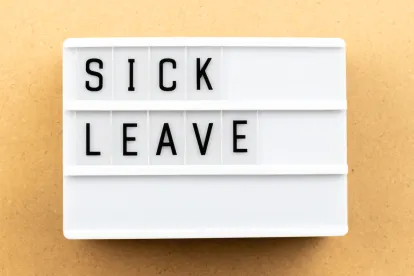On April 3, 2020, Governor Cuomo passed Assembly Bill A9506B, which will grant most New Yorkers paid sick leave annually, building on temporary requirements the state adopted in response to the coronavirus pandemic. The paid sick leave mandate, which was adopted as part of the FY 2021 Executive Budget, will take effect in January 2021. Key provisions are as follows:
Accrual Rate and Start of Accrual
-
Employees accrue sick leave at a rate of no less than one hour for every 30 hours worked.
-
Employees begin to accrue sick leave at the start of employment or on the effective date of the law, whichever is later.
Frontloading
-
Employers may elect to provide employees with the total amount of sick leave at the beginning of the calendar year, provided, however, that employers cannot retroactively reduce or revoke the amount of sick leave based on the number of hours actually worked by an employee during the calendar year.
-
The law is unclear on whether frontloading a sufficient amount of sick leave at the start of each year would remove an employer’s year-end carryover obligations.
Amount of Leave
-
Employers with 4 or fewer employees and a net income less than $1 million must provide at least 40 hours of unpaid sick leave per calendar year.
-
Employers with 5-99 employees and employers with 4 or fewer employees and a net income greater than $1 million must provide at least 40 hours of paid sick leave per calendar year.
-
Employers with 100 or more employees must provide at least 56 hours of paid sick leave per calendar year.
“Calendar Year” Defined
-
For purposes of determining the number of employees pursuant to the law, a “calendar year” is defined as January 1 – December 31.
-
For all other purposes, a “calendar year” may mean either the twelve-month period from January 1 – December 31, or a regular and consecutive twelve-month period, as determined by an employer.
Reasons for Use
Upon the oral or written request of an employee, an employer must provide sick leave for the following purposes:
-
For a mental or physical illness, injury, or health condition of such employee or such employee’s family member, regardless of whether such illness, injury, or health condition has been diagnosed or requires medical care at the time that such employee requests such leave;
-
For the diagnosis, care, or treatment of a mental or physical illness, injury or health condition of, or need for medical diagnosis of, or preventive care for, such employee or such employee’s family member; or
-
For an absence from work due to any of the following reasons when the employee or employee’s family member has been the victim of domestic violence as defined under New York law, a family offense, sexual offense, stalking, or human trafficking:
-
To obtain services from a domestic violence shelter, rape crisis center, or other services program;
-
To participate in safety planning, temporarily or permanently relocate, or take other actions to increase the safety of the employee or employee’s family members;
-
To meet with an attorney or other social services provider to obtain information and advice on, and prepare for or participate in any criminal or civil proceeding;
-
To file a complaint or domestic incident report with law enforcement;
-
To meet with a district attorney’s office;
-
To enroll children in a new school; or
-
To take any other actions necessary to ensure the health or safety of the employee or the employee’s family member or to protect those who associate or work with the employee.
“Family Member,” “Parent,” and “Child” Defined
-
The legislation defines “family member” as an employee’s child, spouse, domestic partner, parent, sibling, grandchild or grandparent, and the child or parent of an employee’s spouse or domestic partner.
-
The legislation defines “parent” as a biological, foster, step- or adoptive parent, or a legal guardian of an employee, or a person who stood in loco parentis when the employee was a minor child.
-
The legislation defines “child” as a biological, adopted or foster child, a legal ward, or a child of an employee standing in loco parentis.
Increments of Use
-
Employers can set a reasonable minimum increment for use of sick leave, which may not be greater than four hours.
Year-End Carryover
-
Employers must allow employees to carryover any unused sick leave at year-end. The law does not provide a cap on the amount of leave permitted to be carried over, but usage may be capped as provided below.
Usage Cap
-
Employers with fewer than 100 employees: May limit the use of sick leave to 40 hours per calendar year.
-
Employees with 100 or more employees: May limit the use of sick leave to 56 hours per calendar year.
Rate of Pay
-
Employees must be paid at their regular rate of pay, or the applicable minimum wage, whichever is greater, while using sick leave.
Existing Sick Leave Policies
-
Employers with existing paid sick leave or time off policies will not be required to provide any additional sick leave if their policies are at least as generous as the law with regard to amount of leave, accrual, carryover and use requirements.
Anti-Retaliation and Job Protection
-
Employers are prohibited from discharging, threatening, penalizing, or in any other manner discriminating or retaliating against an employee because the employee has requested or used sick leave.
-
After using sick leave, an employee must be reinstated to their position, with equivalent pay and other terms and conditions of employment.
Notice of Accrued and Used Sick Leave
-
Upon the oral or written request of an employee, an employer must provide a summary of the amounts of sick leave accrued and used in the current calendar year and/or any previous calendar year within three business days of the request.
Recordkeeping
-
Employers must retain records of employee sick leave for at least six years.
Confidentiality
-
An employer may not require the disclosure of confidential information relating to a mental or physical illness, injury, or health condition of an employee or the employee’s family member, or information related to absence from work due to domestic violence, a sexual offense, stalking, or human trafficking, as a condition of sick leave.
No Payout Upon Separation Requirement
-
There is no requirement for an employer to pay an employee for any unused sick leave upon an employee’s termination, resignation, retirement, or other separation from employment.
Employers should begin to review their existing sick leave policies and either implement new policies or revise existing policies to ensure compliance with the new law’s requirements. With the increasing number of local employment-related ordinances, legal compliance is becoming increasingly complex. Employers should reach out to their counsel for solutions and recommendations.
We expect further guidance by the New York Department of Labor in the coming months and will continue to provide employers with updates on implementation as more information develops.
Preemption:
-
The law does not prevent a city with a population of one million or more from enacting a local law that meets or exceeds the minimum hours and usage provided in the state law.
-
Any sick leave laws currently enacted by a municipality will not be limited or diminished by this state law. Thus, existing New York City and Westchester sick leave laws would remain in effect.



 />i
/>i

